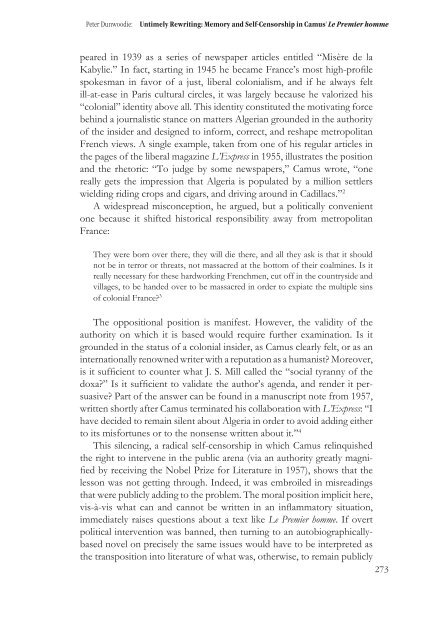Literatura in cenzura - Društvo za primerjalno književnost - ZRC SAZU
Literatura in cenzura - Društvo za primerjalno književnost - ZRC SAZU
Literatura in cenzura - Društvo za primerjalno književnost - ZRC SAZU
- No tags were found...
Create successful ePaper yourself
Turn your PDF publications into a flip-book with our unique Google optimized e-Paper software.
Peter Dunwoodie:Untimely Rewrit<strong>in</strong>g: Memory and Self-Censorship <strong>in</strong> Camus' Le Premier hommepeared <strong>in</strong> 1939 as a series of newspaper articles entitled “Misère de laKabylie.” In fact, start<strong>in</strong>g <strong>in</strong> 1945 he became France’s most high-profilespokesman <strong>in</strong> favor of a just, liberal colonialism, and if he always feltill-at-ease <strong>in</strong> Paris cultural circles, it was largely because he valorized his“colonial” identity above all. This identity constituted the motivat<strong>in</strong>g forcebeh<strong>in</strong>d a journalistic stance on matters Algerian grounded <strong>in</strong> the authorityof the <strong>in</strong>sider and designed to <strong>in</strong>form, correct, and reshape metropolitanFrench views. A s<strong>in</strong>gle example, taken from one of his regular articles <strong>in</strong>the pages of the liberal magaz<strong>in</strong>e L’Express <strong>in</strong> 1955, illustrates the positionand the rhetoric: “To judge by some newspapers,” Camus wrote, “onereally gets the impression that Algeria is populated by a million settlerswield<strong>in</strong>g rid<strong>in</strong>g crops and cigars, and driv<strong>in</strong>g around <strong>in</strong> Cadillacs.” 2A widespread misconception, he argued, but a politically convenientone because it shifted historical responsibility away from metropolitanFrance:They were born over there, they will die there, and all they ask is that it shouldnot be <strong>in</strong> terror or threats, not massacred at the bottom of their coalm<strong>in</strong>es. Is itreally necessary for these hardwork<strong>in</strong>g Frenchmen, cut off <strong>in</strong> the countryside andvillages, to be handed over to be massacred <strong>in</strong> order to expiate the multiple s<strong>in</strong>sof colonial France? 3The oppositional position is manifest. However, the validity of theauthority on which it is based would require further exam<strong>in</strong>ation. Is itgrounded <strong>in</strong> the status of a colonial <strong>in</strong>sider, as Camus clearly felt, or as an<strong>in</strong>ternationally renowned writer with a reputation as a humanist? Moreover,is it sufficient to counter what J. S. Mill called the “social tyranny of thedoxa?” Is it sufficient to validate the author’s agenda, and render it persuasive?Part of the answer can be found <strong>in</strong> a manuscript note from 1957,written shortly after Camus term<strong>in</strong>ated his collaboration with L’Express: “Ihave decided to rema<strong>in</strong> silent about Algeria <strong>in</strong> order to avoid add<strong>in</strong>g eitherto its misfortunes or to the nonsense written about it.” 4This silenc<strong>in</strong>g, a radical self-censorship <strong>in</strong> which Camus rel<strong>in</strong>quishedthe right to <strong>in</strong>tervene <strong>in</strong> the public arena (via an authority greatly magnifiedby receiv<strong>in</strong>g the Nobel Prize for Literature <strong>in</strong> 1957), shows that thelesson was not gett<strong>in</strong>g through. Indeed, it was embroiled <strong>in</strong> misread<strong>in</strong>gsthat were publicly add<strong>in</strong>g to the problem. The moral position implicit here,vis-à-vis what can and cannot be written <strong>in</strong> an <strong>in</strong>flammatory situation,immediately raises questions about a text like Le Premier homme. If overtpolitical <strong>in</strong>tervention was banned, then turn<strong>in</strong>g to an autobiographicallybasednovel on precisely the same issues would have to be <strong>in</strong>terpreted asthe transposition <strong>in</strong>to literature of what was, otherwise, to rema<strong>in</strong> publicly273
















